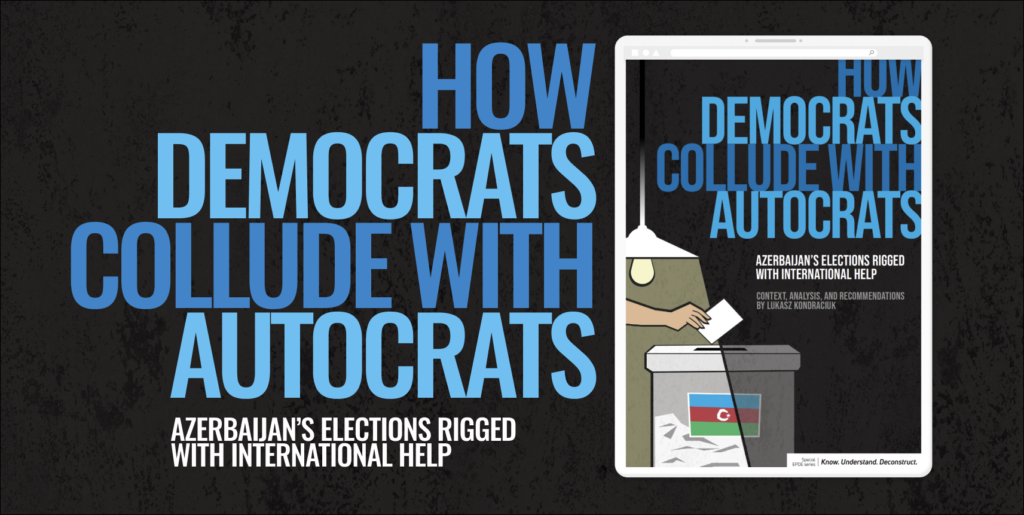
Our latest report reveals how representatives from both democratic and autocratic states helped Aliyev’s regime create an image of international and domestic legitimacy around Azerbaijan’s fraudulent 2024 snap parliamentary election.
On September 1, 2024, the New Azerbaijan Party, led by President Ilham Aliyev, claimed a narrow victory in Azerbaijan’s snap parliamentary election. Although voting day itself was peaceful, the election process was far from democratic. Civil society and independent journalists faced harassment, forced emigration, and arrests throughout the campaign, while both international and domestic observers reported widespread electoral manipulation.
To create the illusion of credible international oversight, the Aliyev regime invited several hundred international observers to the election. Fewer than half of these observers met international standards for election monitoring. The others, despite clear evidence of widespread electoral manipulation, publicly endorsed the election as meeting “high standards,” lending unwarranted legitimacy to a fraudulent practice.
Key findings:
– 107 fake observers identified: Our report lists 107 individuals, including elected or appointed representatives from democratic countries who falsely validated the electoral process
– Election Commissioners as fake observers: We observed an unprecedented increase in involving election administration members in fraudulent observation efforts. We identified officials from Central Election Commissions (CEC) from ten internationally recognized states lending legitimacy to Azerbaijan’s sham elections.
– Trend of Collusion with Autocrats: This troubling trend of CEC representatives as “fake observers” extends beyond Azerbaijan. Our preliminary findings indicate similar patterns in Russia’s 2024 “Single Voting Day” (report forthcoming), highlighting an urgent need to rework the code of conduct of election commissions worldwide to prevent the discrediting of the institutions they represent.
In the context of fake observers coming to legitimize elections in Azerbaijan, EPDE proposes several calls to action to discourage the participation of fake observers, increase transparency, and hold individuals and organizations accountable for undermining democratic processes and discrediting the integrity of the democratic institutions and democratic governments they represent:
1. EPDE calls on international organizations, political parties, and media outlets to regularly check EPDE’s list of fake observers at fakeobservers.org. Our database aims to deter participation by those who, for whatever reason or gain – blackmail, financial, or pure naivety – legitimize undemocratic elections.
2. EPDE calls on key democratic institutions, such as the European Union, U.S. Congress, or the Council of Europe, to publicly denounce and condemn participation in fake observation missions as harmful to global democratic standards. EPDE calls on democratic governments and international organizations to strengthen the diplomatic and political pressure on Azerbaijan to ensure they only invite credible and impartial election observers from organizations complying with international standards of election observation, such as OSCE/ ODIHR, OSCE PA, or the PACE.
3. The EU and other democratic countries should impose targeted sanctions or legal measures against third-country nationals participating in fake observation missions. Such measures could include travel bans, asset freezes, or bans on representing their countries in bilateral and multilateral engagements. This includes exclusion from conferences, academic exchanges, and any form of international cooperation based in the EU or other democratic na- tions.
4. EPDE encourages media outlets globally to raise awareness and educate citizens about the dangers of fake election observation and the role certain individuals play in legitimizing fraudulent elections abroad to reduce their credibility and discourage others from par- ticipating.
5. EPDE urges election monitoring bodies and domestic election commissions globally to adopt stricter transparency measures. These should include publishing a complete, detailed list of all observers, their affiliations, and their observation experience to simplify the identification and discreditation of election observers.
6. Additionally, EPDE calls on institutions and national and regional parliaments to establish and implement laws and clear ethical guidelines for individuals, particularly elected officials, participating in election observation missions. These guidelines should emphasize impartiality and non-alignment with authoritarian regimes. EPDE stresses that violating these guidelines should lead to exclusion from future international democratic election observation missions.
7. Finally, EPDE calls on democratic countries and institutions to introduce career and financial disincentives for individuals participating in these activities, such as barring them from holding positions in publicly funded democratic organizations, NGOs, or international bodies.
Our report and our fake observers database provide a valuable resource for journalists, researchers, and advocacy groups seeking to understand electoral disinformation tactics, networks of malign influence, and learn more about our recommendations for democratic safeguards.
Get in touch with Lukasz Kondraciuk, Head of Electoral Integrity at EPDE, via email: kondraciuk@european-exchange.org
Subscribe to our
newsletter
Sign up for our monthly newsletter
and receive the latest EPDE news
Subscribe to our
newsletter
Sign up for our monthly newsletter and receive the latest EPDE news